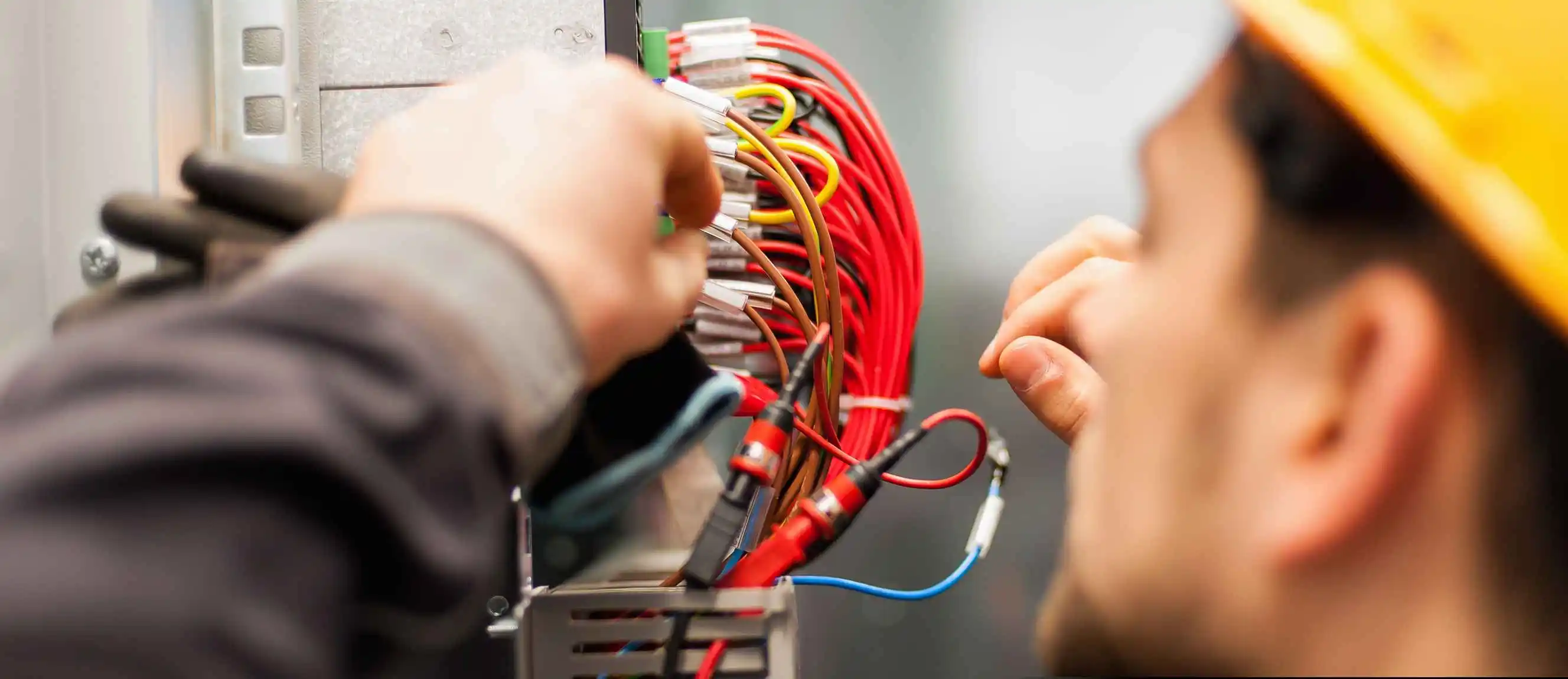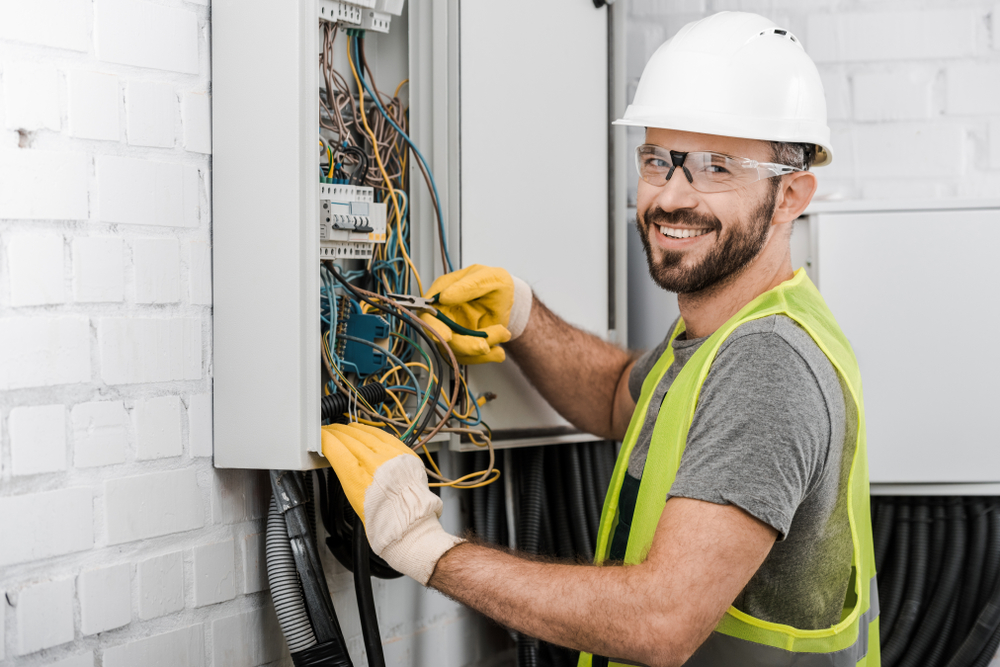The Extensive Function of Industrial Electricians in Ensuring Reliable Power Distribution and Electrical Upkeep in Industrial Settings
The role of industrial electricians expands far past fundamental electrical jobs; they are essential to the stability and performance of industrial operations. Their duties include installation, maintenance, and fixing of complex electric systems, guaranteeing conformity with stringent security criteria. As industries evolve, the combination of sophisticated technologies and wise systems offers brand-new difficulties and possibilities for these professionals. Comprehending just how their knowledge not just safeguards functional connection but also contributes to sustainability initiatives elevates critical concerns regarding the future landscape of electric upkeep in commercial setups. What implications does this have for the workforce and technical improvement?
Importance of Industrial Electricians
In many commercial setups, the duty of electrical contractors can not be overemphasized. These professionals are integral to the operation and upkeep of electric systems, making sure that power distribution is reliable and reliable. Their experience not just sustains the day-to-day functioning of manufacturing procedures however likewise plays an essential role in boosting general workplace safety. Industrial electrical contractors possess specialized knowledge of complex electric systems, including high-voltage equipment and automated equipment, which are vital for contemporary commercial operations.
Furthermore, the need for experienced electrical experts continues to expand, driven by developments in modern technology and enhanced dependence on automated systems. As sectors progress, the demand for electrical contractors that can install, fix, and keep advanced electric infrastructure ends up being vital. Their contributions prolong past mere setup; they are vital players in making sure compliance with safety guidelines and sector criteria, thus lessening threats connected with electrical failings.
Key Obligations and Obligations
Industrial electricians frequently take part in a range of essential duties that are vital to the smooth operation of power circulation systems. Among their primary responsibilities includes setting up, preserving, and fixing electric wiring and devices in industrial settings. This includes making sure that electric systems abide with security regulations and industry standards to prevent dangers such as electric fires or devices failing.
In enhancement to installment jobs, commercial electrical contractors are accountable for fixing and identifying electrical problems. They use specialized tools and strategies to identify faults in equipment and power circulation networks, guaranteeing that any type of malfunctions are promptly resolved to decrease downtime. industrial electricians. Routine upkeep is another critical facet of their function, where they do routine assessments and safety nets to keep systems working ideally

Credentials and skills Called for
Efficiency in electric systems is vital for commercial electricians, as it allows them to properly navigate the complexities of power circulation (bre automation). A strong foundation in electric theory, including understanding of circuits, voltage, existing, and resistance, is crucial. Industrial electrical experts must have an extensive understanding of electrical codes and guidelines to make sure compliance with market criteria
Along with technological knowledge, useful abilities are paramount. Proficiency in troubleshooting and analytical enables electrical experts to identify and settle problems effectively, decreasing downtime in commercial operations. Familiarity with different devices and devices, such as multimeters, oscilloscopes, and power analyzers, is additionally essential for effective repair and maintenance.
In addition, commercial electrical contractors are often required to have formal education, generally culminating in an associate degree or completion of an apprenticeship program. These programs offer hands-on training and theoretical knowledge, gearing up electrical experts with the abilities required for the area.
Qualifications, such as those from the National Institute for Certification in Design Technologies (NICET), can further enhance an electrician's certifications, demonstrating competence and dedication to the occupation. In general, a combination of education and learning, practical experience, and technological abilities is vital for success in this demanding role.
Safety Standards and Conformity
Compliance with safety standards is a basic aspect of the industrial electrical contractor's role in power distribution. Industrial electrical experts are tasked with sticking to a multitude of guidelines and policies developed by companies such as the National Electric Code (NEC) and Occupational Safety And Security and Health Management (OSHA) These criteria ensure not just the risk-free operation of electrical systems yet likewise the protection of employees and devices.
To attain conformity, electrical contractors should conduct normal evaluations and upkeep of electrical systems, recognizing potential threats and executing rehabilitative procedures. This consists of correct grounding, circuit defense, and making use of appropriate individual protective devices (PPE) By keeping an extensive understanding of both local and national codes, electricians can successfully mitigate dangers linked with electrical job.
Furthermore, commercial electricians play an important duty in training personnel on safety techniques and emergency treatments. This education and learning fosters a culture of security within the workplace, minimizing the likelihood of accidents and making sure that all staff members know their obligations pertaining to electric safety.

Future Trends in Electric Upkeep
As modern technology remains to advance, the future of electric upkeep in power distribution is significantly characterized by the combination of wise systems and anticipating analytics. These improvements make it possible for industrial electrical contractors to move beyond typical reactive upkeep approaches, fostering an aggressive method that enhances system dependability and efficiency.
One significant pattern is the adoption of Web of Points (IoT) tools, which promote real-time surveillance of electrical systems. This innovation enables for the collection of large amounts of information, giving understandings right browse around here into equipment efficiency and prospective failing factors. By leveraging anticipating analytics, electricians can anticipate issues before they intensify, decreasing downtime and maintenance expenses.
In addition, the execution of innovative automation link innovations is changing electric maintenance. Automated diagnostic devices can quickly identify faults and suggest restorative actions, enhancing the fixing procedure. This not only improves reaction times yet likewise minimizes human mistake.
Moreover, the expanding emphasis on sustainability is driving the growth of energy-efficient remedies and eco-friendly energy assimilation. As commercial fields progressively embrace greener techniques, electrical experts will certainly play a critical function in keeping these systems, making certain that power distribution lines up with ecological standards. Generally, the future of electric upkeep assures boosted integrity, performance, and sustainability.
Verdict
Finally, commercial electrical contractors are important to the functionality and security of industrial environments. Their expertise in setting up, maintaining, and repairing electric systems guarantees trusted power circulation, which is necessary for operational efficiency. Adherence to safety standards and guidelines additionally mitigates dangers within the work environment. As modern technology evolves, the integration of smart systems and IoT devices will certainly improve preventive maintenance techniques, advertising sustainability why not try this out and energy effectiveness in commercial settings. The function of commercial electricians will certainly remain to increase in significance.
The role of commercial electricians expands far beyond standard electrical tasks; they are indispensable to the security and performance of industrial procedures (licensed electrical contractor). Industrial electrical contractors have specialized understanding of complicated electric systems, consisting of high-voltage devices and automated equipment, which are crucial for modern-day commercial operations
In addition, commercial electrical contractors collaborate with engineers and other experts to create and execute reliable electrical systems customized to particular industrial demands.Efficiency in electrical systems is necessary for commercial electricians, as it enables them to properly navigate the complexities of power distribution.In final thought, commercial electricians are important to the capability and safety of commercial atmospheres.
Comments on “Making the most of Efficiency: How Licensed Electrical Contractors Boost Industrial Electrical Infrastructure”